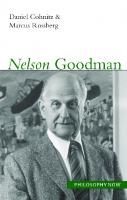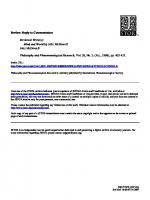
- Author / Uploaded
- Carnap Rudolf
Reply to Nelson Goodman
Rudolf Carnap Philosophy and Phenomenological Research, Vol. 8, No. 3. (Mar., 1948), pp. 461-462. Stable URL: http://li
1,210 15 83KB
Pages 3 Page size 595 x 792 pts Year 2007
Recommend Papers
File loading please wait...
Citation preview
Reply to Nelson Goodman Rudolf Carnap Philosophy and Phenomenological Research, Vol. 8, No. 3. (Mar., 1948), pp. 461-462. Stable URL: http://links.jstor.org/sici?sici=0031-8205%28194803%298%3A3%3C461%3ARTNG%3E2.0.CO%3B2-Y Philosophy and Phenomenological Research is currently published by International Phenomenological Society.
Your use of the JSTOR archive indicates your acceptance of JSTOR's Terms and Conditions of Use, available at http://www.jstor.org/about/terms.html. JSTOR's Terms and Conditions of Use provides, in part, that unless you have obtained prior permission, you may not download an entire issue of a journal or multiple copies of articles, and you may use content in the JSTOR archive only for your personal, non-commercial use. Please contact the publisher regarding any further use of this work. Publisher contact information may be obtained at http://www.jstor.org/journals/ips.html. Each copy of any part of a JSTOR transmission must contain the same copyright notice that appears on the screen or printed page of such transmission.
JSTOR is an independent not-for-profit organization dedicated to and preserving a digital archive of scholarly journals. For more information regarding JSTOR, please contact [email protected].
http://www.jstor.org Sat May 12 00:59:11 2007
DISCUSSION
REPLY TO NELSON GOODMAN
I n my earlier paper1 I have indicated some requirements which I believe must be fulfilled in any application of a system of inductive logic to a given knowledge situation in order to lead to adequate results. In his discussion* Goodman regards these requirements as quite unacceptable; in particular he regards the simplicity of properties as meaningful only with respect to a sphere of reference. I must confess that I too have a rather uneasy feeling concerning the concepts of absolute simplicity and absolute completeness referred to in the requirements. I hope very much that i t will be possible to find a way of avoiding these problematic concepts and replacing them by the kind of relative concepts with which we usually work. But at the present moment I do not see whether or how this can be done. Although those absolute concepts involve problems and difficulties, I do not think that they are meaningless. The question: "Are all properties of individuals in a given universe expressible in a certain language?" is formulated in what I, a t an earlier time: called the material mode of speech. After the appearance of the semantical method it became clear that questions of this kind can be formulated and dealt with in an exact way. We should certainly always look out for the dangers involved in the material mode, also in the present case; but it is not necessary to prohibit this mode completely. I regard it as the task of deductive logic to supply not only positive but also negative ansnTersto questions of logical truth and logical implication (e.g., "52is not implied by S,"). I t is with respect to these negative results that the requirement of simplicity becomes relevant, as explained in my paper. I feel, as Goodman does, that questions concerning the intuitive adequacy of any proposed system of inductive logic are of greatest importance, and I shall discuss in my book questions of this kind in detail nith respect to other systems and to my o ~ m . Of course, this examination may center upon many different points. I have found that an examination of the subsequent two points, which are closely related, seems especially fruitful, because most methods proposed make i t easily possible to calculate values for a t least one of the two cases and me have often a fairly clear intuitive "On the Application of Inductive Logic," Vol. VIII, S o . 1, pp. 133-148. Infirmities of Confirmation Theory," Vol. VIII, S o . 1, pp. 149-151.
Logical Syntax of Language, 1937, Ch. V.
* "On
46 1
feeling of adequacy or inadequacy concerning such results: (1) the degree of confirmation, interpreted as giving a fair betting quotient, for a hypothesis concerning a single unobserved indiyidual,4 (2) an estimate of the relative frequency of a prope@y M in an unobserved sample or in the whole population on the basis of the 'relative frequency of M in an observed sample.6 These results can then also be used for an examination of projectibility. No matter which points are chosen for an examination of adequacy with the help of examples and counter-examples, it seems advisable to use as primitive such properties as Red, Hot, Hard (or similar simple, directly observable properties). This has the advantage of eliminating the othemise bothersome task of showing that the general requirements stated in my paper are fulfilled and, in particular, of showing the logical independence of the primitive properties. This procedure by no means excludes the examination of complex properties; the definition of the property M to be examined may have any complexity desired. I agree with Goodman that the problem of projectibility, which he has pointed out, is interesting and important. -4s I see it, our difference with respect to this problem is only, or mainly, the follo~ving:Goodman seems to believe that the construction of an adequate system of inductive logic pre-supposes a solution of the problem and involves an explicit'formulation of a criterion of projectibility. I think that this procedure, though possible, 'My definition of degree of confirmawould be unnecessarily complicated. . tion (c*) shows a different way of procedure. This definition is rather simple; it is based on t'he concepts of state-description and isomorphism. If this definition should be found to'be inadequate, then, I believe, an adequate definition could be constructed by a similar procedure, based on the same concepts, and not containing 'an explicit reference to projectibility. Even for this procedure however the problem of projectibility is not irrelevant; only the place of its appearance is changed. It remains pertinent for the examination of adequacy. ~
RUDOLF CARNAP.
The so-called singular predictive inference; see my earlier paper $5. &Foran explanation of this estimate and its connection with the degree of confirmation see my paper "Probability as a Guide in Life," Journal of Philosophy, X L I V , 1947, pp. 141-148.









